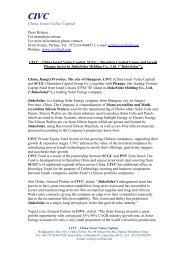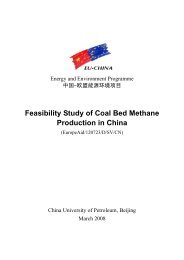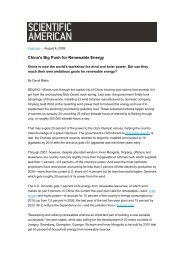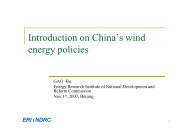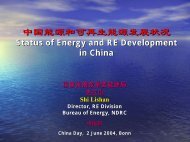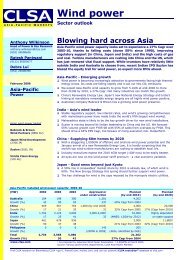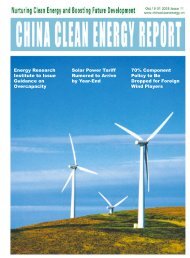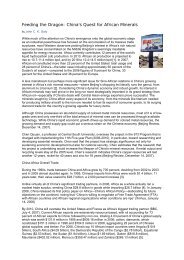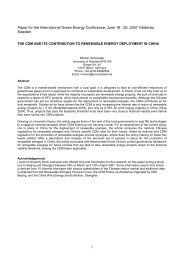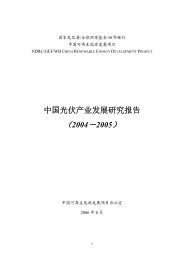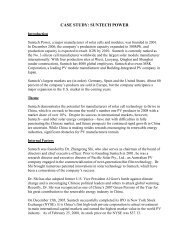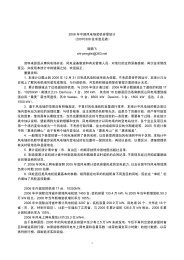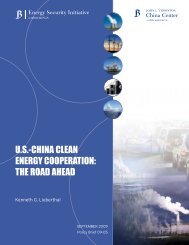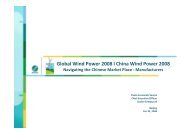LDK Solar Co., Ltd. - Asia Europe Clean Energy (Solar) Advisory Co ...
LDK Solar Co., Ltd. - Asia Europe Clean Energy (Solar) Advisory Co ...
LDK Solar Co., Ltd. - Asia Europe Clean Energy (Solar) Advisory Co ...
You also want an ePaper? Increase the reach of your titles
YUMPU automatically turns print PDFs into web optimized ePapers that Google loves.
Pursuant to the above-mentioned administrative rules, foreign-invested enterprises, such as Jiangxi <strong>LDK</strong><br />
<strong>Solar</strong>, may buy, sell and/or remit foreign currencies for current-account transactions at banks in China with<br />
authority to conduct foreign exchange business by complying with certain procedural requirements, such as<br />
presentment of valid commercial documents. As disclosed, for most capital-account transactions, approval<br />
from the SAFE is a pre-condition. Capital investments by foreign-invested enterprises outside China are also<br />
subject to limitations and requirements in China, such as prior approvals from the PRC Ministry of<br />
<strong>Co</strong>mmerce, the SAFE and the PRC National Development and Reform <strong>Co</strong>mmission, or the NDRC.<br />
Dividend Distribution<br />
The principal regulations governing distribution of dividends by wholly foreign owned enterprises, such as<br />
Jiangxi <strong>LDK</strong> <strong>Solar</strong>, include:<br />
‚ <strong>Co</strong>rporation Law of 1993, as amended;<br />
‚ Wholly Foreign-Owned Enterprise Law of 1986, as amended; and<br />
‚ Wholly Foreign-Owned Enterprise Law Implementation Rules of 1990, as amended.<br />
Under the current regulatory regime in China, foreign-invested enterprises in China, including Jiangxi<br />
<strong>LDK</strong> <strong>Solar</strong>, may pay dividends only out of their accumulated profits, if any, determined in accordance with<br />
the PRC accounting standards and regulations. After making up for any deficit in prior years pursuant to the<br />
PRC laws, a wholly foreign-owned enterprise in China, such as Jiangxi <strong>LDK</strong> <strong>Solar</strong>, is required to set aside at<br />
least 10% of their after-tax profit calculated in accordance with the PRC accounting standards and regulations<br />
each year as its general reserves until the cumulative amount of such reserves reaches 50% of its registered<br />
capital. These reserves are not distributable as cash dividends. The board of directors of a wholly foreignowned<br />
enterprise has the discretion to allocate a portion of its after-tax profits to its staff welfare and bonus<br />
funds, which is likewise not distributable to its equity owners except in the event of a liquidation of the foreigninvested<br />
enterprise.<br />
Regulation of Overseas Investments and Listings<br />
The SAFE issued a public notice in October 2005, or the SAFE notice, requiring PRC residents,<br />
including both legal persons and natural persons, to register with the relevant local SAFE branch before<br />
establishing or gaining control over any company outside China, referred to in the SAFE notice as an<br />
""offshore special purpose company,'' for the purpose of acquiring any assets of or equity interest in PRC<br />
companies and raising funds from overseas. In addition, any PRC resident that is a shareholder of an offshore<br />
special purpose company is required to amend its SAFE registration with the local SAFE branch, with respect<br />
to that offshore special purpose company in connection with any increase or decrease of capital, transfer of<br />
shares, merger, division, equity or debt investment or creation of any security interest. If any PRC shareholder<br />
of any offshore special purpose company fails to make the required SAFE registration and amendment, the<br />
PRC subsidiaries of that offshore special purpose company may be prohibited from distributing their profits<br />
and the proceeds from any reduction in capital, share transfer or liquidation to the offshore special purpose<br />
company. Moreover, failure to comply with the SAFE registration and amendment requirements described<br />
above could result in liability under PRC laws for evasion of applicable foreign exchange restrictions.<br />
The NDRC promulgated a rule in October 2004, or the NDRC rule, which requires NDRC approval for<br />
overseas investment made by PRC-incorporated entities. The NDRC rule also provides that approval<br />
procedures for overseas investment by PRC individuals will be based on the NDRC rule.<br />
On August 8, 2006, six PRC regulatory agencies, including the Ministry of <strong>Co</strong>mmerce, the State Assets<br />
Supervision and Administration <strong>Co</strong>mmission, the State Administration for Taxation, the State Administration<br />
for Industry and <strong>Co</strong>mmerce, the CSRC, and the SAFE, jointly adopted the Regulation on Mergers and<br />
Acquisitions of Domestic Enterprises by Foreign Investors, or the new M&A rule, which became effective on<br />
September 8, 2006. This regulation includes provisions that purport to require special purpose companies<br />
formed for purposes of overseas listing of equity interest in PRC companies and controlled directly or<br />
indirectly by PRC companies or individuals to obtain the approval of the CSRC prior to the listing and trading<br />
of their securities on any overseas stock exchange.<br />
85



